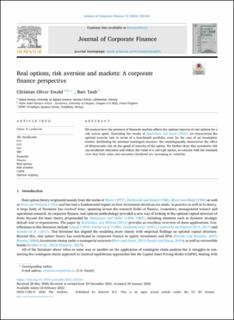| dc.contributor.author | Ewald, Christian Oliver | |
| dc.contributor.author | Taub, Bart | |
| dc.date.accessioned | 2022-11-08T08:24:21Z | |
| dc.date.available | 2022-11-08T08:24:21Z | |
| dc.date.created | 2022-04-28T14:32:34Z | |
| dc.date.issued | 2022 | |
| dc.identifier.citation | Journal of Corporate Finance. 2022, 72 . | en_US |
| dc.identifier.issn | 0929-1199 | |
| dc.identifier.uri | https://hdl.handle.net/11250/3030549 | |
| dc.description.abstract | We analyze how the presence of financial markets affects the optimal exercise of real options for a risk averse agent. Extending the results of Shackleton and Sodal (2005), we characterize the optimal exercise rule in terms of a benchmark portfolio, even for the case of an incomplete market, facilitating the minimal martingale measure. We unambiguously characterize the effect of idiosyncratic risk on the speed of exercise of the option. We further show that systematic risk can accelerate execution and reduce the value of a call-type option, in contrast with the standard view that both value and execution threshold are increasing in volatility. | en_US |
| dc.language.iso | eng | en_US |
| dc.rights | Navngivelse 4.0 Internasjonal | * |
| dc.rights.uri | http://creativecommons.org/licenses/by/4.0/deed.no | * |
| dc.subject | Finance | en_US |
| dc.subject | Real options | en_US |
| dc.subject | Risk aversion | en_US |
| dc.subject | CAPM | en_US |
| dc.subject | Optimal stopping | en_US |
| dc.title | Real options, risk aversion and markets: A corporate finance perspective | en_US |
| dc.type | Peer reviewed | en_US |
| dc.type | Journal article | en_US |
| dc.description.version | publishedVersion | en_US |
| dc.subject.nsi | VDP::Samfunnsvitenskap: 200::Økonomi: 210 | en_US |
| dc.source.pagenumber | 1-20 | en_US |
| dc.source.volume | 72 | en_US |
| dc.source.journal | Journal of Corporate Finance | en_US |
| dc.identifier.doi | 10.1016/j.jcorpfin.2022.102164 | |
| dc.identifier.cristin | 2019853 | |
| cristin.ispublished | true | |
| cristin.fulltext | original | |
| cristin.qualitycode | 2 | |

